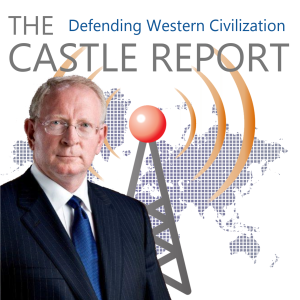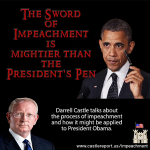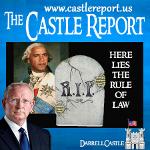-
The Real Meaning of the Clinton Decision
Podcast: Download
Darrell Castle discusses how the rule of law and the right of the people to govern themselves are in grave danger.
THE REAL MEANING OF THE CLINTON DECISION
Hello, this is Darrell Castle with today’s podcast. Today is Friday, July 8, 2016, and on today’s podcast we are going to discuss the death not only of the rule of law, but of the people’s ability to govern themselves. I’m not going to rehash the information that you already know about James Comey’s press conference in which he said essentially that there was evidence of broken laws, which would have been prosecuted in others but not in one of our Royalty. That is a rough paraphrase but accurate. What I intend to discuss is what the actions of Mrs. Clinton, and what Mr. Comey said about those actions, really mean.
-
Original Intent
 Today we are going to discuss the original intent of the United States Constitution. This is relevant for our discussion because I am the Constitution Party’s candidate for President of the United States and the Constitution Party was formed originally by a group of people who believed that the original intent of the United States Constitution is still relevant today and can be defended intellectually to the nation.
Today we are going to discuss the original intent of the United States Constitution. This is relevant for our discussion because I am the Constitution Party’s candidate for President of the United States and the Constitution Party was formed originally by a group of people who believed that the original intent of the United States Constitution is still relevant today and can be defended intellectually to the nation.How could the founders imagine, let alone prepare for the possibility that the United States might abandon the correct method of constitutional interpretation (i.e. original intent) and with it abandon the rule of law in general. Today not only has original intent been abandoned but it is not understood by the average American who looks on the mention of it as extremely right wing or at best simplistic.
No judges employ it, and no lawyers argue it. It is not desired by any politicians or by their special interest groups for whom the Constitution’s quaint words and phrases serve only as a cover story for what best lines their pockets.
-
The Most Important Part of the Constitution
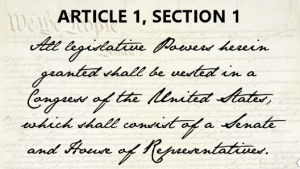 I am often asked by the media in interviews and by the public in question and answer sessions “What is the most important part of the Constitution?”
I am often asked by the media in interviews and by the public in question and answer sessions “What is the most important part of the Constitution?”All of the Constitution is important and a good argument could be made for many sections, including the Bill of Rights, but I believe Article I Section I is most important. “All legislative powers herein granted shall be vested in a Congress of the United States which shall consist of a Senate and House of Representatives.”
With that beginning sentence The Constitution vests all policy making and law making authority of the federal government in congress. The term “vested” means that Congress cannot lawfully surrender or reassign its authority. The vesting of all legislative authority in a congress answerable to “We the People” is perhaps the bedrock premise of our legal system.
-
The United States, Israel, and the Constitution Party
When Americans talk about the nation of Israel, the discussion generally centers on questions concerning its right to exist, or of its right to self-defense. If a nation exists, as Israel clearly does, and has since 1948, then it also has a natural right to self-defense. That should not be in question. What we should be asking is “What is the nature of the relationship between the United States of America and the nation of Israel?”
Clearly the U.S. has a relationship with Israel, but what of its origin and its nature? It seems to be a bit strained right now. In fact, it would be fair to say that the relationship between President Obama and Prime Minister Netanyahu is the worst ever between a U.S. President and an Israeli Prime Minister and after all, isn’t that what it comes down to—the relationship between both leaders as representatives of their respective nations?
-
The United States and Israel – Part II
Podcast: Download
Darrell Castle continues the discussion of Part I with a look at the Constitution Party Platform as it relates to Israel.
-
Impeachment
Podcast: Download
Darrell Castle talks about the process of impeachment and how it might be applied to President Obama.
-
What Ever Happened to Officer Friendly
Podcast: Download
Darrell Castle talks about the increasing militarization of local police forces in America.
-
The Rule of Law RIP
Podcast: Download
Darrell Castle talks about the IRS scandal and how it threatens the Rule of Law and the Constitution.
-
Response to the President’s State of the Union Address
by Darrell Castle, Constitution Party National Committee Vice-Chairman
 Last night President Obama delivered his State of the Union address, as he is required by the Constitution to do once each year. Although he covered many different areas, he concentrated on only three: the domestic economy, which includes what he called job creation, domestic policy topics such as education and energy, and foreign policy, which includes military and defense issues.
Last night President Obama delivered his State of the Union address, as he is required by the Constitution to do once each year. Although he covered many different areas, he concentrated on only three: the domestic economy, which includes what he called job creation, domestic policy topics such as education and energy, and foreign policy, which includes military and defense issues.The President told us that the nation is doing well economically and is on its way to recovery from recession. Evidence of this recovery, according to the President, is the “booming stock market.”
-
Lame Duck, or Just Lame?
by Darrell Castle, Constitution Party National Committee Vice-Chairman
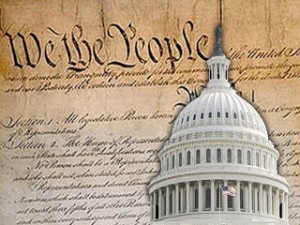 “All legislative powers herein granted shall be vested in a congress of the United States, which shall consist of a Senate and House of Representatives.” (United States Constitution, Article I Section 1.).
“All legislative powers herein granted shall be vested in a congress of the United States, which shall consist of a Senate and House of Representatives.” (United States Constitution, Article I Section 1.).This section of the Constitution places all legislative or law-making power clearly in the hands of Congress, and therefore denies them the right to transfer that responsibility to the president. In light of the Constitutional responsibilities of Congress, then, let’s take a brief look at not only what this lame duck session has accomplished, but also what has been accomplished in recent years.
The lame duck session passed 3 of the 4 major items on its agenda. The three were the START treaty, the repeal of “Don’t Ask, Don’t Tell” (DADT), and the “deal” to extend the Bush tax cuts. The only thing they were denied was President Obama’s DREAM Act (AIM: amnesty for illegal minors).


